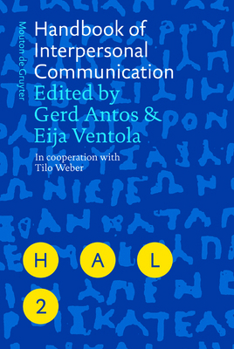Handbook of Interpersonal Communication
(Book #7 in the Handbooks of Applied Linguistics [HAL] Series)
Interpersonal communication (IC) is a continuous game between the interacting interactants. It is a give and take - a continuous, dynamic flow that is linguistically realized as discourse as an on-going sequence of interactants' moves. Interpersonal communication is produced and interpreted by acting linguistically, and this makes it a fascinating research area. The handbook, Interpersonal Communication, examines how interactants manage to exchange facts, ideas, views, opinions, beliefs, emotion, etc. by using the linguistic systems and the resources they offer. In interpersonal communication, the fine-tuning of individuals' use of the linguistic resources is continuously probed. The language used in interpersonal communication enhances social relations between interactants and keeps the interaction on the normal track. When interaction gets off the track, linguistic miscommunication may also destroy social relationships. This volume is essentially concerned with this fine-tuning in discourse, and how it is achieved among various interactant groups.
The volume departs from the following fundamental questions:
Interpersonal communication is seen and researched from the perspective of what is being said or written, and how it is realized in various generic forms. The current research also gives attention to other semiotic modes which interact with the linguistic modes. It is not just the social roles of interactants in groups, the possible media available, the non-verbal behaviors, the varying contextual frames for communication, but primarily the actual linguistic manifestations that we need to focus upon when we want to have a full picture of what is going on in human interpersonal communication.
It is this linguistic perspective that the volume aims to present to all researchers interested in IC. The volume offers an overview of the theories, methods, tools, and resources of linguistically-oriented approaches, e.g. from the fields of linguistics, social psychology, sociology, and semiotics, for the purpose of integration and further development of the interests in IC.,
Topics e.g.:
Orientation to interaction as primarily linguistically realized processes Expertise on theorizing and analyzing cultural and situational contexts where linguistic processes are realized Expertise on handling language corpora Expertise on theorizing and analyzing interaction types as genres Orientation to an integrated view of linguistic and non-linguistic participant activities and of how interactants generate meanings and interact with space Expertise on researching the management of the linguistic flow in interaction and its successfulness.




